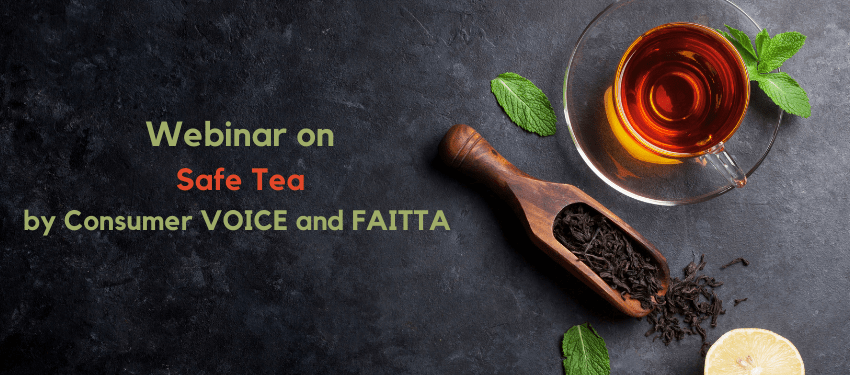Webinar on “Safe-Tea”

Mornings in most Indian homes begin with a cup of freshly brewed tea. Long conversations, heated arguments, debates and even gossips are incomplete without that cup of tea. The popularity of tea is such that in India, now one can find various types of tea – masala chai, cutting chai, gur chai,elaichi chai, adrak chai, green tea, black tea and the list is endless. Tea consumption which originated in ancient China and reached the European continent in the 16th century, in India, its cultivation began in Assam in the 19th century.
Tea has several health benefits besides being a sign of Indian culture. Tea is believed to boost immunity, improve digestion and also helps in elimination of toxins from the body. White tea also helps in lowering cholesterol level and regulating blood pressure. A blend of effective herbs in tea quiets helps in relaxing the mind and body. When it comes to health benefits, it is very important to know what exactly you are consuming.
Safe Tea Webinar – Summary
The webinar marking the World Consumer Rights Day on 15th March was addressed by Mr. Viren Shah, Chairman, FAITTA (Federation of All India Tea Traders Association), Mr. Pramod Kumar Sahoo, Deputy Chairman & CEO, Tea Board of India and Dr. Harinder Singh Oberoi, Advisor (QA) FSSAI (Food Safety and Standards Authority of India). The Panellists covering technical aspects were Mr. Sandip Sanyal Principal Scientist, Tea Research Association (TRA), Mr. Prashant Bhansali, President, UPASI (United Planters’ Association of Southern India), Mr. Paras Desai, ED Wagh Bakri Tea Group, Mr. Ashim Sanyal COO Consumer-Voice and Dr. Sanu Jacob, Director, FSSAI.
Some of the key takeaways from the webinar
- Tea remains the most penetrated beverage in Indian households and is India’s No.1 ‘common persons’ drink. Tea is perceived as a natural drink with proven health benefits Therefore consumer health and safety aspects of Tea must be fully ensured.
- Colour addition in Tea poses the biggest challenge. This is prohibited under the FSSAI Regulations and therefore should be treated as a significant adulterant. Colour addition detracts the natural health properties of Tea and adversely impacts the interest of both the consumer and genuine trade.
Colour addition can occur at the primary manufacturing stage and at post manufacture at the trade level, as well. The problem must be dealt with collectively by Manufacturers / Traders, Tea Board of India, FSSAI and Consumer Organizations. Greater consumer awareness needs to be generated and regulatory interventions strengthened at the State level. - Iron particles in Tea should not be viewed and classified as adulterants but only as incidental during Tea manufacture. The abrasion caused due to movement and friction of Tea Rollers & CTC machines (used to macerate the green tea leaves) result in the presence Iron particles (both free and impregnated) in manufactured Tea. Various steps of manufacture from withering to sieving could also contribute to incidence of iron filings.
- While FSSAI has set a tolerance limit of 250 mg/kg for Iron Filings (an incidental contaminant), the industry continues to exercise all possible caution towards removal / minimizing its presence by extraction through high powered magnets as a process control during manufacture and post manufacture steps. The Tea Research Association is also spearheading initiatives involving:
a) Prescription of Good Manufacturing Practices (GMP)
b) Development of higher efficiency Iron Particles Extraction Machine,
c) Development of a Micronizer – an innovative Processing Machine avoiding metal to metal contact and
d) Plasma Nitriding of CTC Rollers improving their surface hardness. BIS has developed a method to determine iron filings and FSSAI is also in the process of developing a method.
- The need for judicious and rational use of pesticides and also adoption of Integrated Pest Management was also highlighted, as an important initiative to manage the pesticide residues in Tea and offering a safe product to Consumers.
- Responsible sections of the Tea trade and established Tea packet Brands follow rigorous checks and process controls to ensure delivery of quality and safe products to the consumer.
- From a consumer perspective Brands enjoy strong commitment and loyalty. Therefore, quality and safety issues need strong enforcement going beyond nominal standards. The FSSAI’s Safety-on-Wheels initiative need to be strengthened and extended to cover the common man’s drink.
- Consumer awareness plan to be developed by Consumer VOICE.
- Iron particles in Tea are incidental contaminants as the abrasion caused due to movement and friction of Steel Tea Rollers & CTC machines (used to macerate the green tea leaves) result in the presence Iron particles (both free and impregnated) in manufactured Tea. FSSAI has already set a tolerance limit of 250 mg/kg and the industry continues to exercise all possible caution towards meeting this limit, through removal / minimizing presence of iron filings by extraction through high powered magnets as a process control during manufacture and post manufacture steps. BIS has developed a method to determine iron filings and FSSAI is also in the process of developing a method.
- The need for judicious and rational use of pesticides and adoption of Integrated Pest Management are the important initiatives to be adopted to manage the pesticide residues in Tea and for offering a safe product to Consumers.
Related
Decoding Cyber Coverage in India: Your Ultimate Guide
In today's technology-driven landscape where digitalization is ubiquitous, companies confront an escalating threat landscape in the form of...
Navigating Insurance Options: Comprehensive Coverage for Diabetics in India
As the prevalence of diabetes continues to rise steadily in India, individuals grappling with this chronic condition encounter myriad challenges,...
Understanding International Travel Insurance
International travel insurance serves as a financial product crafted to shield travellers from unforeseen events and expenses while journeying...


